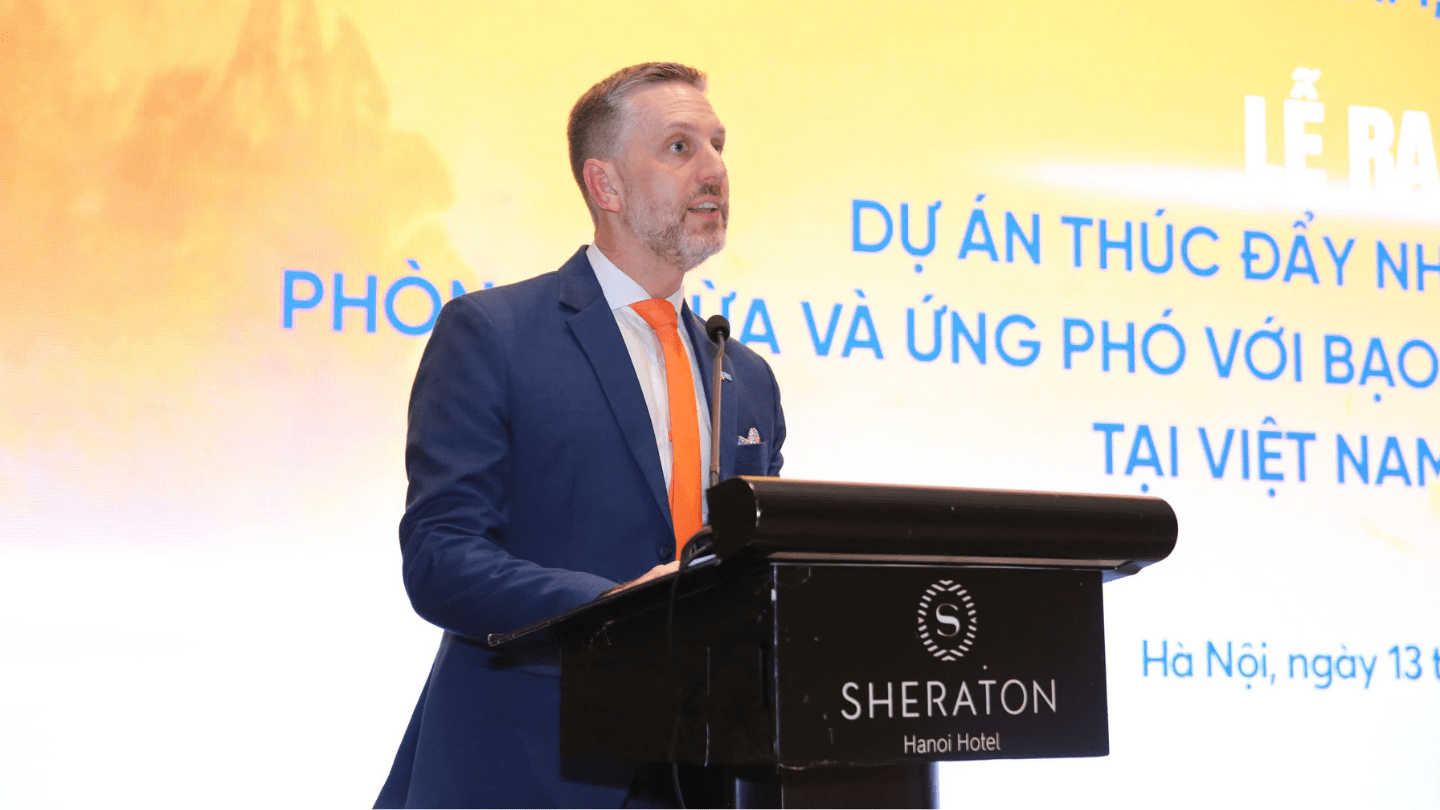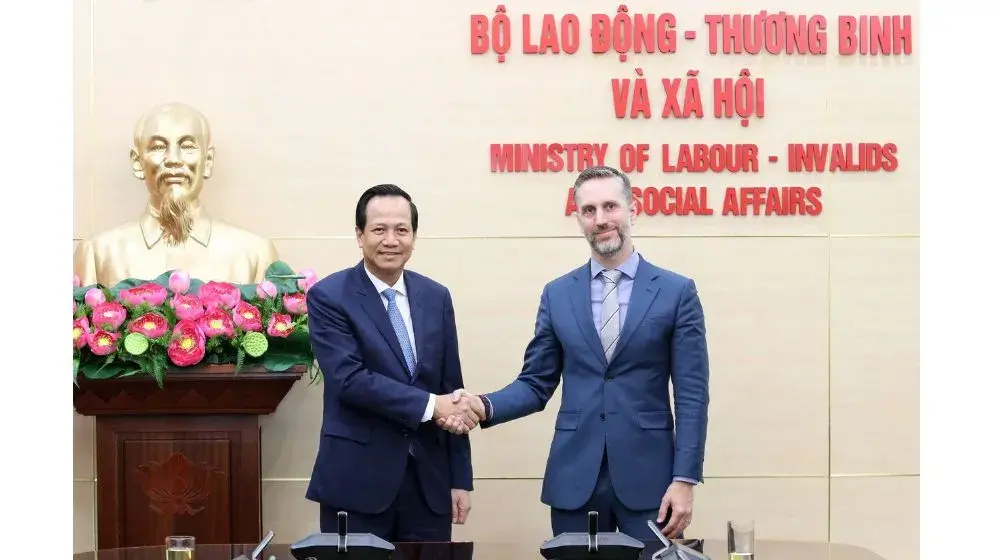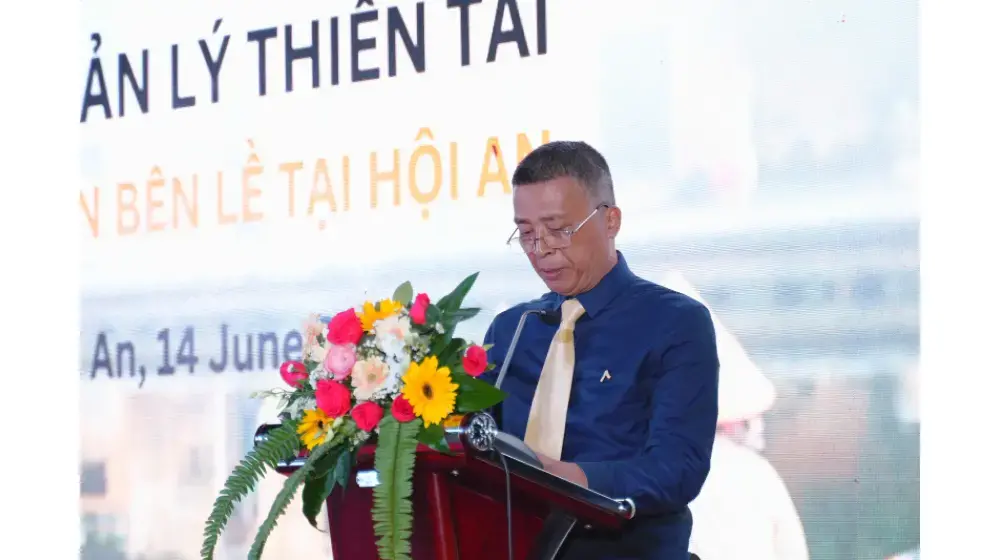- Mr Lee Byung Hwa, KOICA Viet Nam Country Director;
- Representatives from the Vietnamese Government’s ministries and agencies;
- Representatives from UN Agencies and the Diplomatic Missions in Viet Nam;
- Representatives from the Local Authorities of the provinces of Quang Ninh, Ha Tinh and Khanh Hoa
Four days ago, I had the honour of joining our partners from the Governments of Viet Nam and Australia to officially launch Viet Nam’s 5th Once-Stop Service Centre, known as Anh Duong House, in Hoa Binh province. The five Anh Duong Houses in Viet Nam provide essential, integrated services to support survivors of gender-based violence.
Today, it’s my privilege to join Mr Lee Byung Hwa, Viet Nam Country Director of the Korean International Cooperation Agency – KOICA to launch two important projects which will see two more Anh Duong Houses open their doors to support GBV survivors and ensure an existing one in Quang Ninh can recover from the devastation caused by Typhoon Yagi last year.
These two projects, with a total fund of USD 5.5 million from KOICA, will support Viet Nam in strengthening its GBV response efforts and uninterrupted support for survivors.
UNFPA highly values our long-standing partnership with KOICA. Together, over nearly a decade, we have made remarkable progress in eliminating violence against women and children in Viet Nam. In 2020, this partnership introduced the innovative One Stop Service Centre model in Quang Ninh province. Together we began to raise public awareness, transform attitudes and change behaviours towards GBV, in particular encouraging survivors to speak out and see the support they deserve and need.
We know that significant challenges remain. According to a 2019 national study, nearly two in three women in Viet Nam aged 15–64 have experienced some form of violence, but over 90% do not seek help from public services. This underscores the need for continued investment and action.
Therefore, the first Anh Duong House quickly set the foundation for replicating more in other locations across Viet Nam. Three more followed in 2022 in Thanh Hoa province, Danang city and HCM City with financial support from the Government of Japan. Subsequent operational costs have been covered through funding from the Government of Australia as well as the new one I mentioned in Hoa Binh and a sixth that will open in An Giang province in a few months’ time.
So far, the OSSCs have provided integrated support services to 1,670 survivors and handled over 26,000 hotline calls. These centres are a powerful example of providing comprehensive support to GBV survivors, demonstrating how multisectoral coordination - fostered through partnerships with MOLISA, local authorities, and international partners - can transform responses to violence and create safe, accessible pathways to recovery.
KOICA’s new funding focuses on scaling up two additional Anh Duong Houses. UNFPA in Viet Nam will work closely with the Ministry of Labour, Invalids and Social Affairs, Ministry of Culture, Sports and Tourism and other relevant ministries and agencies as well as the local authorities of Quang Ninh, Ha Tinh and Khanh Hoa to fully implement this project by the end of 2027. The project will prioritise marginalised groups, including individuals living with disabilities and LGBTQI+ communities. It will also raise awareness among employers, employees, labour unions, and the community about sexual violence and harassment at the workplace, especially at industrial zones. A core component of this project is behaviour change, engaging men and boys through targeted communication campaigns to foster positive masculinities and address the root causes of violence.
Additionally, KOICA’s 2nd bridge phase project to “Support Emergency Relief and Post Disaster Recovery for Quang Ninh One Stop Service Center” will ensure the provision of uninterrupted services for Gender-Based Violence survivors. UNFPA will continue to provide technical support to strengthen disaster preparedness and response capabilities at both local and national levels, ensuring communities are better equipped to handle GBV in emergencies.
Importantly, these new projects provide opportunities for Viet Nam to learn international expertise and best practices to enhance effective prevention and response to gender-based violence. They also support the implementation of Viet Nam’s National Programme on GBV Prevention and Response (2021-2025); the Strategy on Gender Equality (2021-2030) and the amended Law on Domestic Violence Prevention and Control, which was adopted by the National Assembly in November 2022. They also align with Viet Nam’s commitments to the Sustainable Development Goals (SDGs), particularly SDG 5 on gender equality.
I am grateful to MOLISA for its dedication and leadership in scaling up the OSSC model. The Anh Duong Houses in Quang Ninh, Thanh Hoa, Da Nang, Ho Chi Minh City and Hoa Binh are a powerful demonstration of what can be achieved through strong collaboration. The planned opening of new Centres in An Giang and, through this project hopefully in Ha Tinh and Khanh Hoa, will further expand support to GBV survivors.
Achieving our shared aim to end violence against women and girls requires sustained effort, commitment and partnership. Together, we are working for a future where all women, children and individuals in Viet Nam, including the most vulnerable, can live free from violence, ensuring that no one is left behind.
Thank you for your attention!




